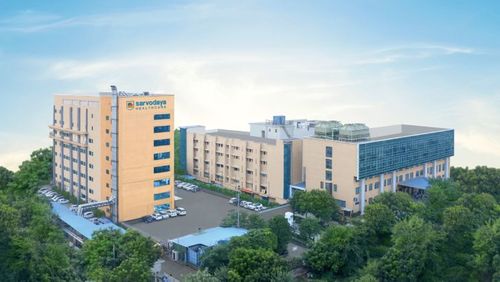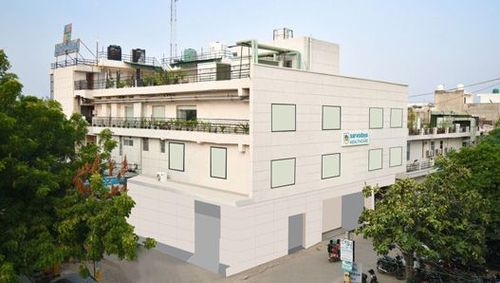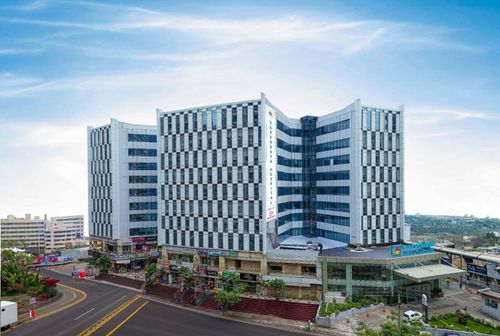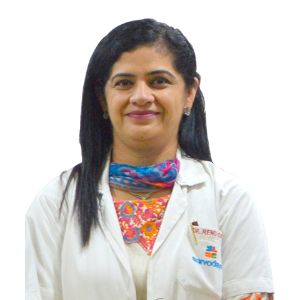Overview
Uterine fibroids, also known as leiomyomas or myomas, are common non-cancerous growths affecting women of childbearing age. Fibroids can be as small as a seed or large enough to distort the uterus, often without causing any symptoms. Many women discover fibroids incidentally during a routine pelvic exam or ultrasound.
At Sarvodaya Hospital, the uterine fibroids surgery offered by our experienced team prioritises comfort, safety, and long-term well-being, enabling women to maintain optimal reproductive health in a supportive and caring environment. Recognised as a trusted fibroid removal surgery hospital in Faridabad, we combine advanced techniques with personalised care for the best outcomes.
Symptoms of Uterine Fibroids
- Heavy or prolonged menstrual bleeding
- Pelvic pain or pressure
- Frequent urination or difficulty emptying the bladder
- Constipation or rectal pressure
- Lower back pain
- Pain during intercourse
- Abdominal swelling or bloating
- Reproductive issues: infertility, recurrent miscarriage, or pregnancy complications
- Fatigue due to anemia from heavy bleeding
Causes of Uterine Fibroids
- Hormonal factors: estrogen and progesterone influence
- Genetic predisposition/family history
- Age (common in women 30–50 years)
- Obesity or high body weight
- Early onset of menstruation
- Lifestyle factors: diet, alcohol consumption, lack of exercise
- African-American ethnicity (higher incidence)
- Other reproductive health conditions
Diagnosis of Uterine Fibroids
Diagnosing uterine fibroids at Sarvodaya Hospital is thorough and patient-centred, ensuring clarity and comfort at every step. Our approach leverages advanced tools and the expertise of uterine fibroid specialists in Delhi NCR to deliver accurate results.
- Review of symptoms and medical history: We start by discussing your symptoms, menstrual patterns, and health background to identify any fibroid-related concerns.
- Pelvic examination: A gentle pelvic check can often detect an enlarged or irregular uterus, pointing toward possible fibroids.
- Pelvic ultrasound (primary imaging tool): Ultrasound is the first choice for visualising fibroids, revealing their size, number, and exact location in the uterus.
- Blood tests: Blood tests help identify anaemia from heavy bleeding or rule out related conditions.
- Differential diagnosis to rule out other pelvic masses: Your doctor evaluates for other potential causes of symptoms, ensuring the most accurate diagnosis before moving to the best treatment for fibroids.
Treatment Options & Technology for Uterine Fibroids
- Observation for asymptomatic/small fibroids: Small fibroids that cause no symptoms often require only regular monitoring and reassurance; no immediate intervention is needed.
- Hormonal therapy: Hormonal options can control heavy bleeding, reduce pain, and shrink fibroid size for many women.
- Non-hormonal options: These medicines help manage pain and excessive bleeding, especially for those unable to use hormones.
- MRI-guided focused ultrasound surgery: A non-invasive option using focused ultrasound energy to shrink fibroids under real-time MRI guidance.
- Myomectomy: Surgical removal of fibroids while preserving the uterus, ideal for women wanting to retain fertility. Robotic-assisted myomectomy offers greater precision, minimal scarring, and faster recovery.
- Hysterectomy: Complete removal is reserved for women with severe symptoms or fibroids unresponsive to other therapies.
Prevention & Lifestyle Modification
Proactive lifestyle choices can play a vital role in reducing the risk of uterine fibroids and supporting overall reproductive health. Recognized as a Reputed gynaecology Hospital in Faridabad, Delhi NCR,Sarvodaya hospital’s experts offer personalised guidance that empowers women to take charge of their well-being.
- Maintain optimal body weight: Keeping your weight within a healthy range helps balance hormones and lowers the risk of developing fibroids.
- Balanced diet with low red meat and rich in fruits/vegetables: Focus on plenty of plant-based foods and limit red meat intake to support uterine health and reduce inflammation.
- Regular exercise and activity: Staying physically active boosts metabolism, regulates hormone levels, and contributes to overall well-being.
- Stress management techniques: Practices like meditation, yoga, or deep breathing can help minimize the impact of stress on your hormonal balance.
- Routine gynaecological check-ups for early detection: Regular visits allow for timely screening and early management of any concerns, helping you stay ahead of potential complications.
Pre-/Post-Treatment Lifestyle Modifications
Pre-treatment:
- Before any procedure, our team evaluates your overall health and checks for anemia caused by heavy bleeding, supporting safer recovery.
- We provide clear, honest education about all available uterine fibroids treatment options, their risks, benefits, and what to expect throughout the process.
- Nutritional advice and fitness suggestions help optimise your body for treatment and promote healing.
Post-treatment:
- Resume activities step-by-step, allowing your body to heal comfortably while following your doctor’s guidance.
- Watch for unusual symptoms and stay committed to scheduled follow-ups for early detection of recurrence or any complications.
- Ongoing medical reviews ensure lasting results and health maintenance.
- Maintain a balanced diet and, if prescribed, continue iron supplements to restore normal blood counts after fibroid-related anemia.















